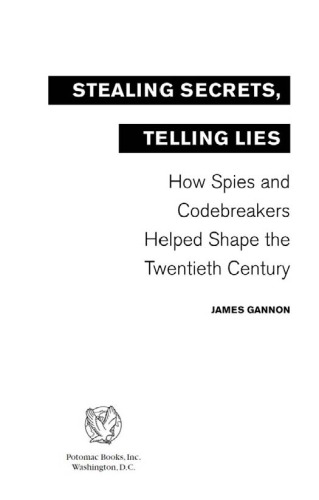
Stealing Secrets, Telling Lies
How Spies and Codebreakers Helped Shape the Twentieth Century
- اطلاعات
- نقد و بررسی
- دیدگاه کاربران
نقد و بررسی

August 27, 2001
While most of the stories here are already well known—the deciphering of the German Enigma machine's code, for example, or the penetration of British intelligence by the Soviet-controlled Cambridge Five spy ring—Gannon, a former documentary producer and self-described "reporter with a nose for a good story," retells them with aplomb, positioning them nicely to fit his theme. The familiar story of undercover German spy Richard Sorge, who worked against Hitler as a member of the Nazi Party, takes on both pathos and suspense. In Gannon's hands, the unraveling Sorge, weakened by alcoholism and despair, goes to his fate anew; his execution comes as a sad surprise, even though it really isn't news to anyone. The tale of another WWII secret agent, Rudolf Roessler (code-named "Lucy"), takes on a fresh aura of mystery although "...more than half a century since Roessler breathed the neutral Swiss air in war-torn Europe, nobody knows the truth." Gannon's basic strength is in depicting the delicate balance of espionage and showing how a nation's fate can hinge on the concealment or discovery of vital information. Overall, this is an entertaining survey that successfully plants the subliminal question: What if?

August 3, 2001
Quality intelligence is vital to effective decision-making, and this book reviews some of the crucial personalities and operations that helped shape our world. World War II was the central event of the last 100 years, and much of the book is given over to recounting the desperate efforts to gather information during that conflict. Most of these stories are well known, so the history of the Polish spy who helped bring down the Communist government is a welcome addition. Gannon believes that Donald Maclean was a more important spy than Kim Philby because of the former's greater access to American secrets, but perhaps most important was Klaus Fuchs, who passed America's atomic secrets to the Soviets. The resulting Cold War stalemate came to define the century. The author is a freelance writer and former TV documentary producer. Although he used some archival sources, he culled most of the information from the open literature. Suitable for public and academic libraries, alongside Phillip Knightley's The Second Oldest Profession: Spies and Spying in the Twentieth Century (LJ 12/86) and Jeffrey T. Richelson's A Century of Spies: Intelligence in the Twentieth Century (LJ 8/95). Daniel K. Blewett, Coll. of DuPage Lib., Glen Ellyn, IL
Copyright 2001 Library Journal, LLC Used with permission.




دیدگاه کاربران